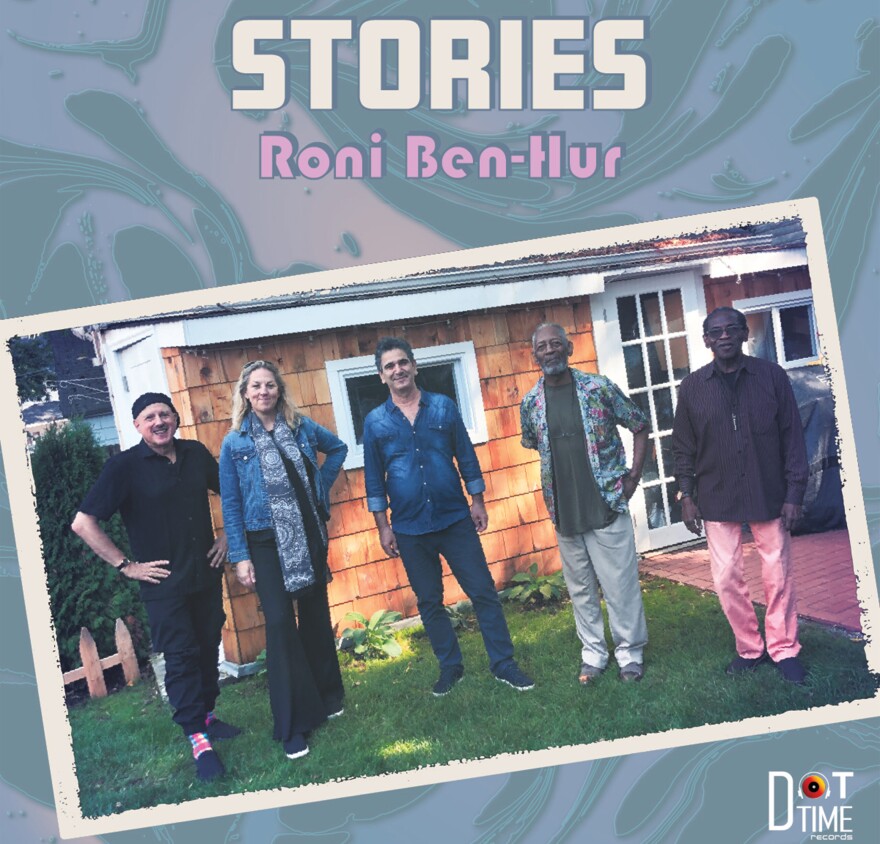August 2, 2021. In addition to being a supremely talented musician, Roni Ben-Hur is a smart man. The veteran guitarist—Israeli born and raised—not only understands how to craft tunes, but also gets how to build an album that reflects the essential touchstones of his musicality.
As a North African (Ben-Hur’s family is Tunisian) he’s always found common cause with bossa nova and common origins with bossa’s African rhythms and Moorish influences; as a Barry Harris protégé, his commitment to bebop has been just as abiding; and as a Jew, the music of Gershwin, Arlen, Kern, and Berlin—so much of which is rooted in Jewish melodies—is all but hardwired into his spiritual and musical motherboard.
His latest, Stories, confirms this diversity of influences with nods to bebop, bossa nova, and his Sephardic roots. It also confirms his intelligence, for he knew that to fuse so many elements of his musical identity together on a single album, he’d need to find musicians of comparable depth and breadth.
In George Cables (piano), Victor Lewis (drums), Harvie S (bass), and Ingrid Jensen (trumpet), he’s found the right individuals, and the end product is even greater than the sum of its highly credentialed component parts.
Many of the tunes here suggest that this may be Ben-Hur’s most personal album to date.
“Ha’omnam” takes the achingly beautiful words of Hebrew-language poet Leah Goldberg and sets them against a bossa-nova backdrop that brings to mind the billowy quality of a fine linen suit, how it flutters and flaps in a cool coastal breeze. Israeli vocalist Tamuz Nissim delivers Goldberg’s lyrics about finding hope in the midst of unspeakable darkness—the Goldberg poem on which the song is based was written in 1941, during the worst days of the Holocaust— with that rare blend of humanity and coolness that separates artists from singers.
She proves it isn’t necessary for one to strain to convey meaning. If Nissim’s style and feel reminds you of Melody Gardot, whose understatedly beautiful Sunset in the Blue we profiled here earlier this year, you’re picking up on the same qualities I am.
“La Serena” is another one drawn from Ben-Hur’s ancestral roots—and another one anchored by a brilliant vocalist. This time it’s Magos Herrera—who also appears down-record on “A Redoblar”— singing an old Sephardic folk song about unrequited love in the ancient Judeo-Spanish dialect of Ladino. You don’t need to understand a single lyric to be moved by this one; Herrera’s voice in any language is inherently affecting. And here, her husky alto and the Middle Eastern trappings call to mind “Ankara Sundays” from vocalist Somi’s new album, Holy Room.
Ben-Hur is as fine an accompanist as he is an improvisor, and that’s saying something. His style is always communicative but never overwrought; it’s humble and melodic and so, so clean. But at least on this tune, it’s Jensen, the Diva Jazz Orchestra-alum and current member of female supergroup Artemis, whose playing is most memorable.
But you won’t forget that Ben-Hur is the headliner here. A listen to the next tune, a take on pianist Elmo Hope’s “Something for Kenny” that swings pure and true, will ensure that. Ben-Hur wastes no time making his mark here; he hits the hole hard and fast, without any needless dancing in the backfield. His playing reminds me of one of those runners whose stride is so long and graceful, you don’t even realize how fast he’s really moving. There’s a fluidity and grace to Ben-Hur’s playing that makes everything seem easy, especially that which you know most definitely is not.
Elmo Hope was a contemporary and friend of Thelonious Monk, so this one dovetails perfectly into the closer, Cables’ Monk-inspired “Melodious Funk.” Cables, like Ben-Hur’s mentor, Harris, is a part of that generation that’s kept the flame of bebop’s innovators—like Monk and Hope—alive, and this one testifies to that. It’s full of Monk’s signature mischievous playfulness and circuitous circuitry, which can sometimes disorient less fluent players. But Cables speaks Monk as though it were his native tongue.
Elsewhere, there’s “After the Morning,” a tribute to the late pianist John Hicks showcasing Jensen on muted trumpet, and “But I Had to Say Goodbye,” Ben-Hur’s mournful ballad about a love it pains you to have to walk away from. It’s a complex emotion to capture and Cables and Harvie S frame it perfectly, showing us what anguished acquiescence to hard truth feels and sounds like.
Juxtapose that with “Ma’of,” perhaps Ben Hur’s most personal piece on an album brimming with them. Written for his two daughters, there’s a sophisticated balance here of the simultaneous joy and terror that fathers feel as they watch their children grow from dependent dreamers into self-sufficient doers. There are moments signalling parental trepidation, but what shines through mostly isn’t ambivalence or even guarded optimism but pride.
It’s a song, Ben-Hur says, about “taking flight,” and that’s exactly what these musicians communicate. The anticipation, the uncertainty, the trepidation, the dread, the excitement of becoming an adult, all the while keeping what Ben Hur terms the “melody of youth” close at hand, for safekeeping.


